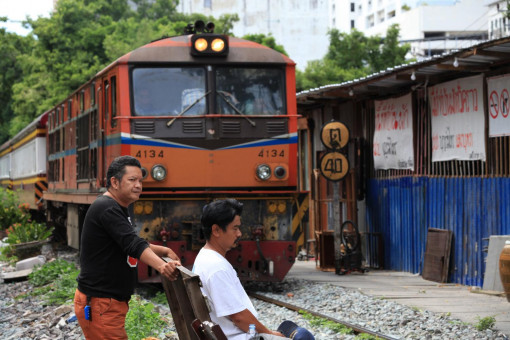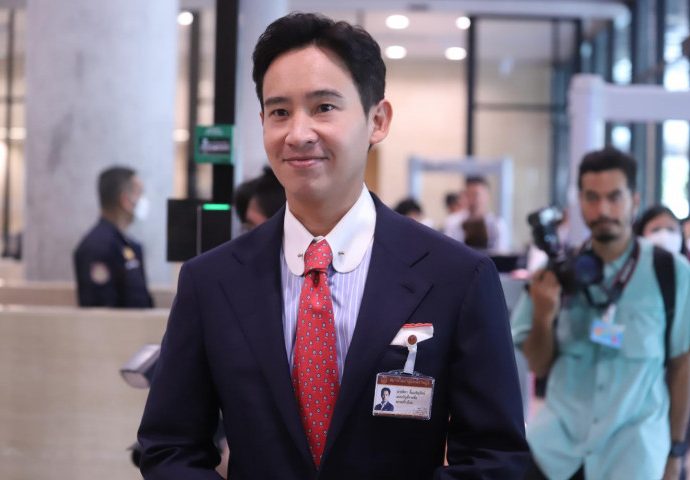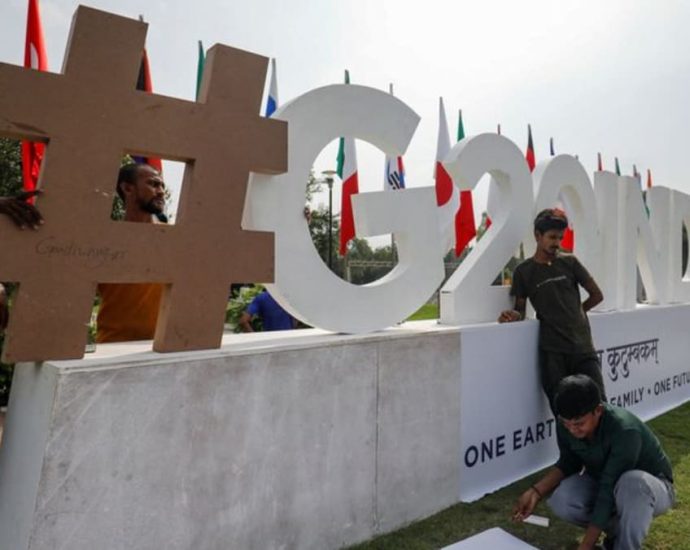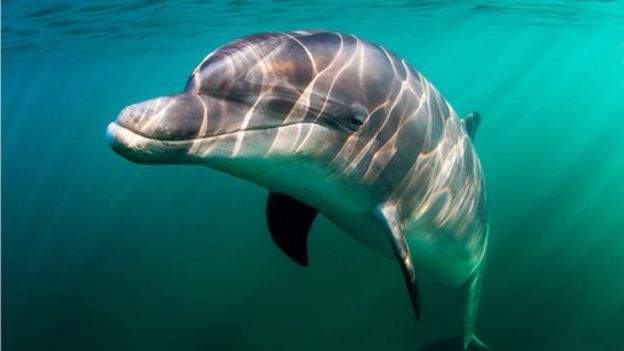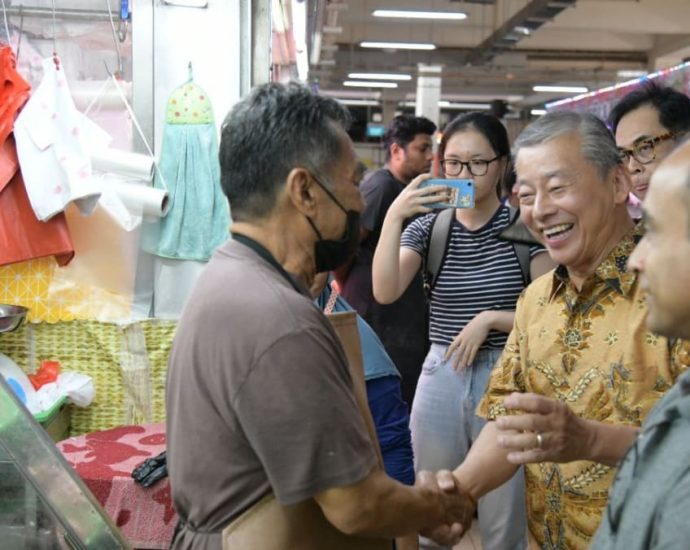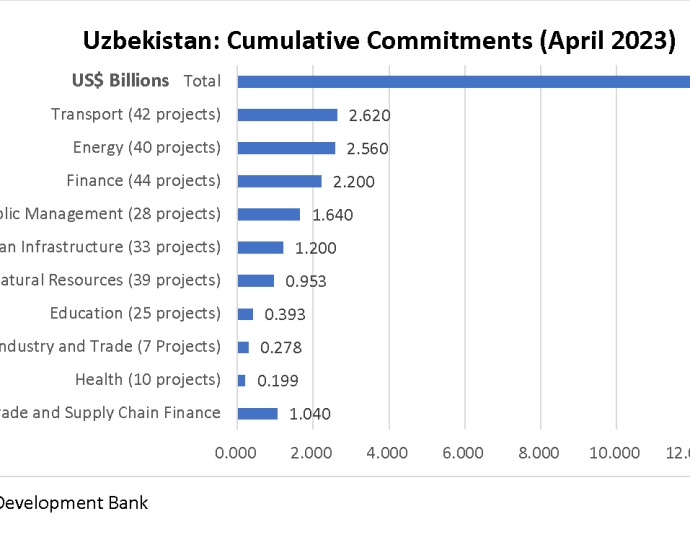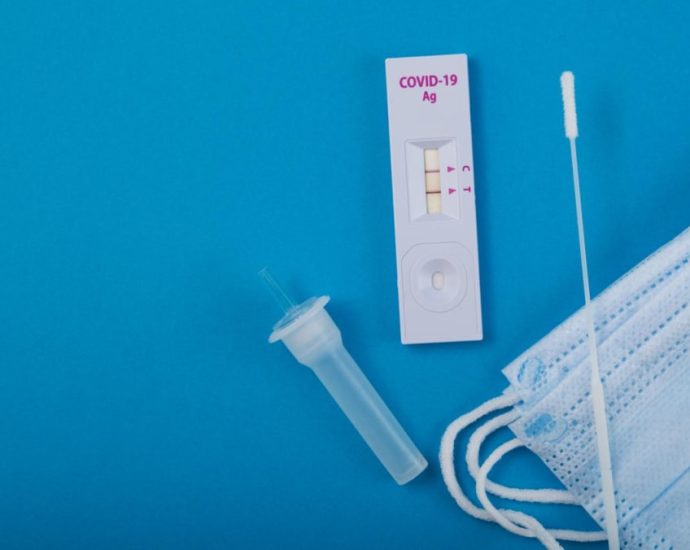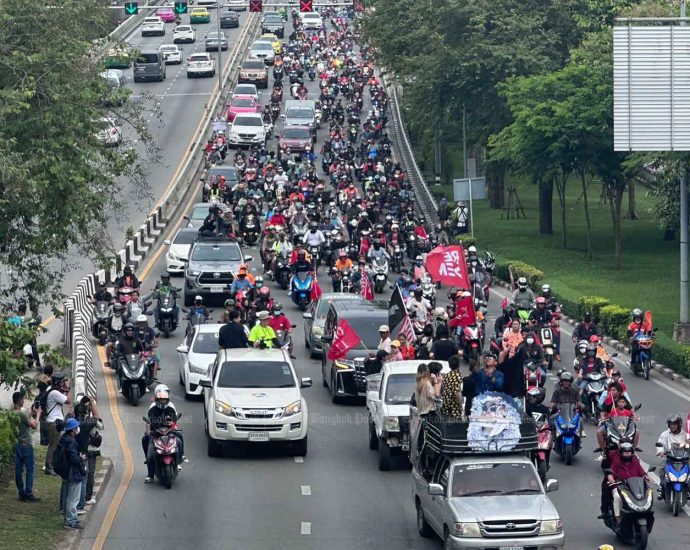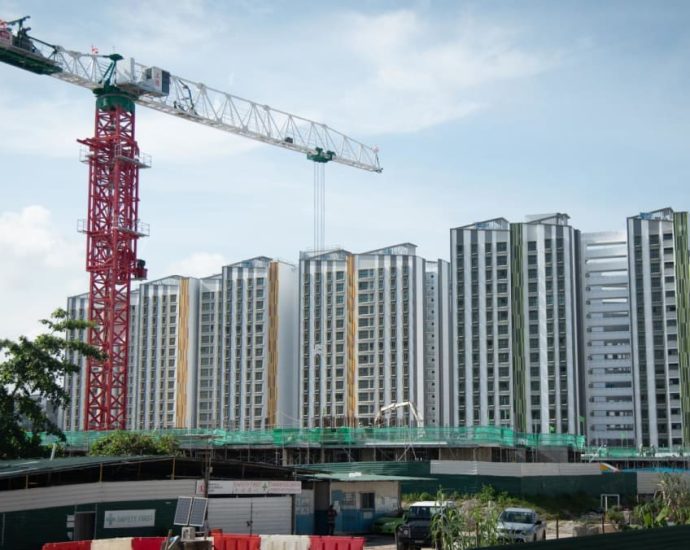Keeping lives on track
Families must move to make way for high-speed SRT project, writes Supoj Wancharoen

Chao Kerdaree sits on a bench between two rail tracks, facing a row of shanty houses. Soon his family and another 100 more will be forcibly evicted from their Bun Romsai community built along a one-kilometre rail track in Phaya Thai district.
“I’ve lived here for more than 20 years. Our community was established more than five decades ago but when we are told to leave by the landowner (the State Railway of Thailand), we have to go. We don’t have other options,” said Chao, the community leader.
The Bun Romsai community can be accessed via Phetchaburi Soi 5 and is about 800 metres away from Phaya Thai BTS station.
The community is part of an area where the Don Mueang-Suvarnabhumi-U-Tapao high-speed rail route will be built.
The 224-billion-baht high-speed rail project is part of the Eastern Economic Corridor (EEC) to connect three airports, Don Mueang Airport in Bangkok, Suvarnabhumi Airport in Samut Prakan and U-Tapao Airport in Rayong.
SRT awarded construction of the high-speed rail project in 2019 to the Charoen Pokphand Group-led consortium called AERA1.
The project is expected to boost economic development and create more than 100,000 jobs after it opens in 2029, says the Transport Ministry.
The SRT needs to clear the land for the project. Bun Romsai and the other two communities, or 300 families in total living along the Eastern Line railway, must also move, according to SRT.
Even though people have lived on the land for more than half a century, the Bun Romsai community has never been registered in Bangkok’s system because the community is built on public land.
It is believed the community was started by staff or former staff of the SRT, said Asst Prof Boonlert Visetpricha, a lecturer of Sociology and Anthropology at Thammasat University. They built houses on the vacant land to be close to their workplaces.
When other poor people learned that they too could live in the area, they also built houses there, he said. They were not land encroachers but they were settlers, he said.
“They are low-income earners who struggle to live in the capital. But they play an important role in society as they sell workers low-cost food or snacks.
“Society needs them as one of the gears to keep things running,” he said.
Mr Chao is a motorcycle taxi driver who provides services around the Phaya Thai area.
He settled into the community 20 years ago when he said his family could not afford to rent a room in the capital.
“I built my home here because we could not pay for rent. I used to work in a factory but I’m now a motorcycle taxi driver. My wife has a stall selling grilled pork balls.
“Our combined earnings are 20,000 baht a month. Although it is not much, we can pay for our two sons’ study, one in Matthayom 5 (Grade 11) and the other who has now graduated from vocational school,” he said.
Phob Raksitanont, another resident, said he was born in the nearby Daeng Bu-Nga community before moving to the Bun Romsai community after the landowner in Daeng Bu-Nga sold the land. He is a motorcycle delivery man.
He lives with his wife who has a job as a maid in a nearby office building, his parents and his aunt. The family makes 20,000 baht a month.
When SRT told the 150 families in the Bun Romsai community to leave the land in January 2020, the first reaction among locals was that they did not want to move because they have nowhere else to go.
“We negotiated with the SRT. We even met the SRT’s governor (Nirut Maneephan). He told us he will find a win-win situation,” said Mr Chao.
“But in 2021, some of us received removal warrants from the court,” he said.
After locals protested, Mr Chao said the SRT agreed to work with the Community Organisation Development Institute to build a new community for them and others who need to be relocated.
They will move to a low-cost housing estate in Soi Mo Leng, near the Makkasan Reservoir, which is about 2km away from their community.
The new housing project is expected to start next year and will be completed by 2025.
In the meantime, locals asked the SRT to build temporary shelters for them when their houses are demolished.
For those who do not want to live in the low-cost housing project, the SRT will offer them compensation for their house’s demolition.
Mr Chao said about 200 out of 300 families living in the affected communities including Bun Romsai decided to take the offer while the others decided to stay and wait for their new homes.
“We have lived here for so long and have a stable income here. We have developed our community, once known as a hotbed of crime many decades ago, into a peaceful home,” he said.
“As low-income earners in a big city, we only need an affordable place to live,” said Mr Chao.
Coalition bloc to meet ahead of 2nd vote
PUBLISHED : 17 Jul 2023 at 04:30

The leaders of eight prospective coalition parties seeking to form the next government will meet to discuss their next move today, ahead of the second round of voting to select a prime minister on Wednesday, a source close to the matter said.
The meeting, which had originally been scheduled for tomorrow, will be held today instead, because some of the parties in the bloc are planning to hold their internal meetings tomorrow, the source said, adding the meeting venue has yet to be decided.
The source said if Move Forward Party (MFP) leader Pita Limjaroenrat is renominated for the second round of voting but fails to secure enough support to become the next prime minister, Pheu Thai may be allowed to lead the formation of the next government with the support of the other seven prospective coalition parties.
On Friday, Mr Pita said in a video clip on social media that he would step aside and allow Pheu Thai take the lead in forming a government if he fails to secure enough support in parliament to become prime minister in the second round of voting.
Asked to comment on claims that Srettha Thavisin, one of Pheu Thai’s three prime ministerial candidates, may be nominated for prime minister in the second round of voting, Pheu Thai secretary-general Phumtham Wechayachai said yesterday the party can nominate its candidate for the vote if the other seven coalition parties give it the green light.
Asked about the MFP’s plan to amend Section 272 of the constitution to remove the Senate’s power in co-electing a prime minister, Mr Phumtham said Pheu Thai and MFP have yet to reach an agreement on the matter.
The issue will be raised again at today’s meeting, Mr Phumtham said.
He went on to say that if the MFP insists on renominating Mr Pita, it must explain how it plans to gather enough support for him, particularly from the 250 senators, in the second round of voting. “There must be a clear answer before the July 19 vote,” he said.
Mr Pita failed to gather enough support in parliament to back his bid for premiership last Thursday.
Section 112 of the Criminal Code, also known as the lese majeste law, was cited as the main reason why many senators refused to back his nomination as the MFP has repeatedly insisted on amending the law.
China’s response not encouraging on G20 common framework for debt: Report
GANDHINAGAR, India: China has not given an encouraging response so far on reaching a common understanding with the G20 bloc on the issue of restructuring the debt of vulnerable countries, a source aware of the matter said on Sunday (Jul 16). G20 nations are also not keen on a one-size-fits-allContinue Reading
Swimmers injured in dolphin attacks on Japan beach
 PA Wire
PA WireFour swimmers have been injured in dolphin attacks on a beach in central Japan, officials say.
One man, in his 60s, suffered broken ribs and bites to his hands after a dolphin rammed him a few metres off Suishohama beach in the town of Mihama, Fukui prefecture, early on Sunday.
Another man, in his 40s, sustained arm bites in a separate incident on the popular beach the same morning.
Two more people were injured by the mammals later in the day.
Fukui has now recorded six such attacks this year, local police say.
Signs have been put up telling swimmers to avoid approaching or touching the mammals.
While dolphins are not usually aggressive to humans, hostility towards swimmers is not unheard of.
Scientists have suggested that wild bottlenose dolphins find swimming alongside humans “incredibly stressful,” finding evidence that it disrupts their behavioural routines.
In the Republic of Ireland, two women were injured in the space of ten days in 2013 by the same dolphin, including one who suffered from a broken rib.
As well as hostility towards humans – dolphins are known at times to behave extremely violently towards their fellow sea creatures.
In Cornwall, south-west England, a bottlenose dolphin was seen flipping a porpoise into the air as part of an aggressive attack.

You may be interested in watching:
This video can not be played
To play this video you need to enable JavaScript in your browser.
-
-
11 August 2022
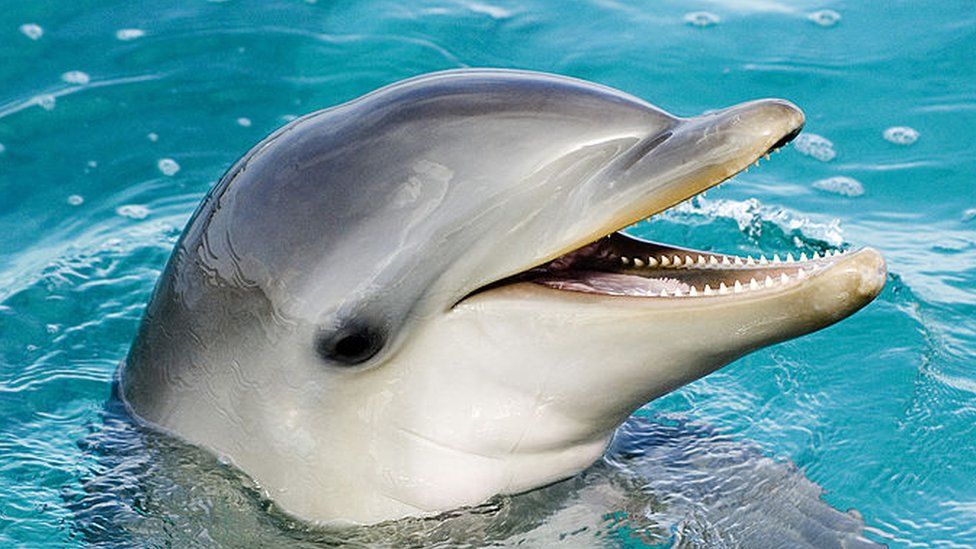
-
-
-
27 July 2021
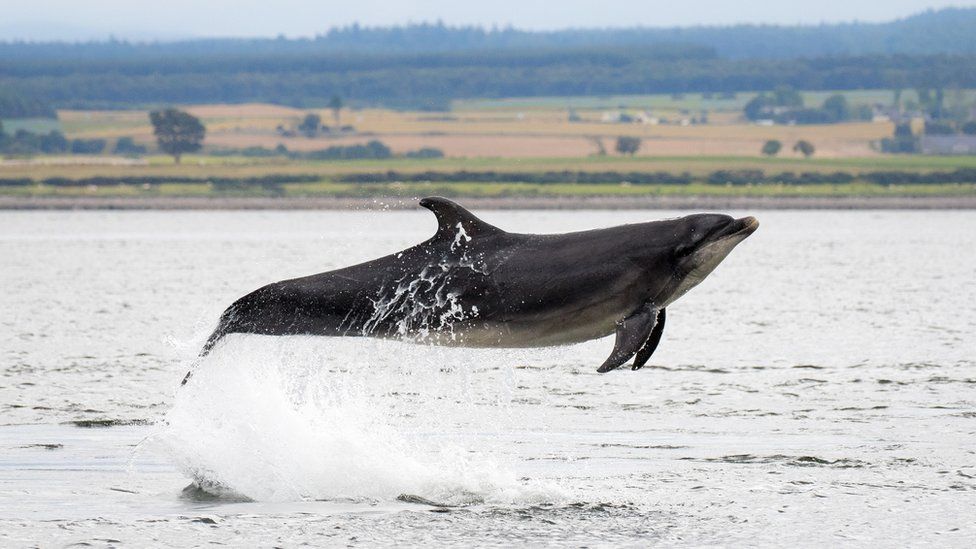
-
-
-
3 August 2013
.jpg)
-
-
-
24 February 2022
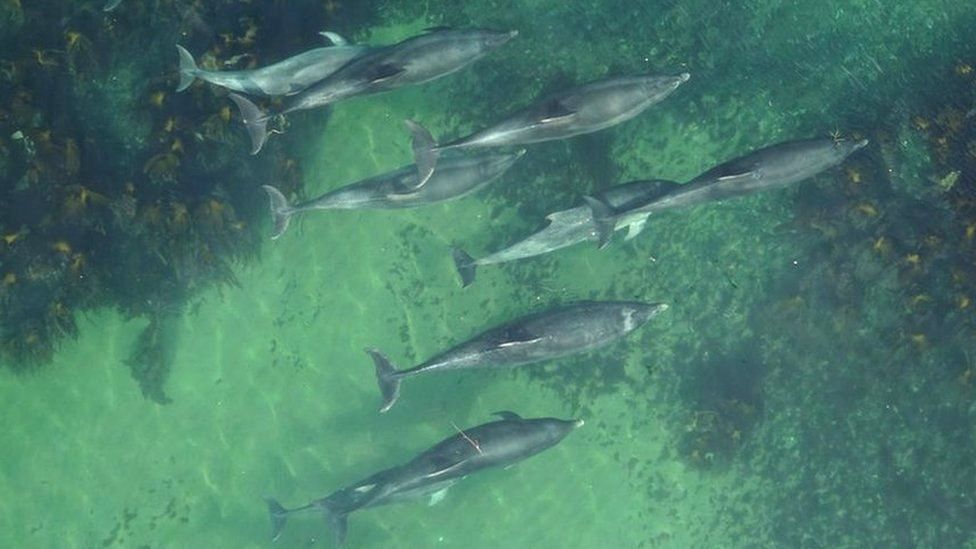
-
Police warn of fake SMS directing Android users to download ‘anti-scam’ app
SINGAPORE: The Singapore Police Force on Sunday (Jul 16) issued a warning over a fake SMS impersonating as its “anti-scam centre (ASC)”. “In this scam variant, members of the public would receive a scam SMS from ‘ASC’, requesting them to download and install an “anti-scam” app to ensure the security ofContinue Reading
Presidential candidate should not have worked in government-linked firm or sovereign wealth fund: George Goh
SINGAPORE: A potential presidential candidate should not be someone who is a senior executive in a government-linked company or is an employee of an organisation that receives investments from a sovereign wealth fund, said presidential hopeful George Goh. Mr Goh was responding to questions from the media during his visitContinue Reading
Uzbek president re-elected with 87% of the vote
Uzbek voters passed a referendum last April extending the presidential term of office from five to seven years and allowing the current president, Shavkat Mirziyoyev, to call a snap election. He lost no time in doing so.
According to the Central Election Commission, he bagged 87.1% of the vote on July 9.
The total is impressive, as it was bound to be considering he could plausibly claim credit for a strong economy and domestic peace and tranquility, had the state apparatus and media behind him as well as various “powers of incumbency,” and was fortunate enough to be facing a slate of hapless, inexperienced candidates.
But is his vote total credible?
The Organization for Security and Cooperation in Europe hinted at the absence of meaningful political opposition. Its Election Observation Mission noted that the “early presidential election was technically well prepared but took place in a political environment lacking genuine competition.” Fair enough, but that hardly settles the matter of electoral credibility one way or the other.
Landslide victories, whether in Uzbekistan or elsewhere, may or may not call into question the legitimacy of the electoral process, but they do raise doubts about the viability of challengers and the dearth of capable alternative choices (see my Asia Times article “Kazakhstan presidential vote – scam or real deal?”).
But one cannot discount the possibility that Mirziyoyev’s victory reflects his personal popularity and demonstrated ability to govern effectively in a nascent democracy.
Consider the case of India’s Narendra Modi. He had a personal approval rating of 87% when he took office in 2014 and his government’s approval rating stood at 93%, according to Pew Research. Now, eight years later, his personal popularity stands at 73%, according to The Times of India.
Or take Hungary’s Viktor Orban. Last year, he won his fourth consecutive electoral victory, handily defeating his opposition, much to the consternation of Brussels and the international media.
In parliamentary systems, it is rare to achieve an absolute majority, but Modi and Orban have done so several times in a row. While the opposition alleges that their victories were the result of bullying, intimidation and fraud, it is hard to prove that a head of state’s electoral triumph was bogus just because he won by a huge margin. It could just as well be that voters approved of his policies, governing skills, and personal traits.
Advantage goes to the president
In the run-up to the election, Mirziyoyev was able to exploit his advantage as a recognized international statesman, which none of his opponents could begin to do. In Uzbekistan, he is known as a skilled head of state who represented the country’s national interests and aspirations without kowtowing to the Great Powers or taking sides in the so-called Great Game.
Over the past months, his trips overseas have boosted his domestic prestige. Who else could have met with Iranian President Ebrahim Raisi (a move not viewed in Uzbekistan as evil in itself) or landed major agreements with the other Central Asian republics and the European Union or expanded pan-Turkic engagement with the support of the presidents of Azerbaijan, Tajikistan and Turkey?
What’s more, Mirziyoyev tapped into an emergent national populism that rejects neoliberal economics and refuses to sacrifice the common good to the gods of efficiency and the interests of global capital.
Social and political stability
During the campaign, Mirziyoyev took credit for a relatively strong economy and rode it to victory. The International Monetary Fund recently projected real GDP growth this year of 5.3%.
Mirziyoyev met this summer with the vice-president of the World Bank and could point to significant progress in developing bilateral partnerships worth some US$11 billion. He also capitalized on major investments from the European Bank for Reconstruction and Development and the Asia Development Bank.
Over the past several years, Mirziyoyev has been working – with considerable success – to transform the country’s largely Soviet-style economy to one based mainly on free enterprise. In so doing, he has resisted intemperate calls for the total sell-off of Uzbekistan’s national assets to the usual assortment of carpetbaggers, leeches and no-goodniks who regularly materialize in Tashkent preaching the Gospel of Progress.
Mirziyoyev’s call in May for a Third Renaissance resonated with the people.
His pitch “to build new schools, kindergartens and hospitals, to raise the quality of education and medicine, to address the problems of water and energy supply, roads and transportation, to increase the number of workplaces, to create the new opportunities for entrepreneurship, and to ensure justice, to eradicate bureaucracy and corruption” might have rung hollow in view of the country’s lamentable legacy of corruption and nepotism, but apparently did not.
Deeds over words
Although Mirziyoyev’s access to the media gave him a decided advantage over his opponents, that’s the case whenever incumbents are up for re-election. Even if ballot-box stuffing and/or other forms of fraud and “administrative measures” were employed, they may have padded the president’s total but probably didn’t make much difference.
It makes more sense that he convinced the electorate, just as Modi and Orban have done, that he would continue to reform the economy without abandoning the poor and the middle class, increase their access to credit, medicine and education, manage the Great Powers at a time of unprecedented peril, and chip away at decades of ingrained corruption and nepotism.
Interestingly, the major media’s coverage of the election has been unusually muted, signaling that Brussels and London may be changing their emphasis in dealing with Tashkent – more carrot and less stick.
For Washington’s part, the US Embassy, in its post-election statement, could only say that it “notes” popular support for Mirziyoyev while urging respect for the rule of law, checks and balances and individual rights.
Be that as it may, Mirziyoyev’s challenge now is to breathe life into his electoral promises and stay out of foreign entanglements. He must carry on with the transformation of society and the economy without selling out the poor and emergent middle class. If he fails to do so, the goodwill he now commands is likely to evaporate quickly.
Households in Singapore to receive six ART kits from Jul 17
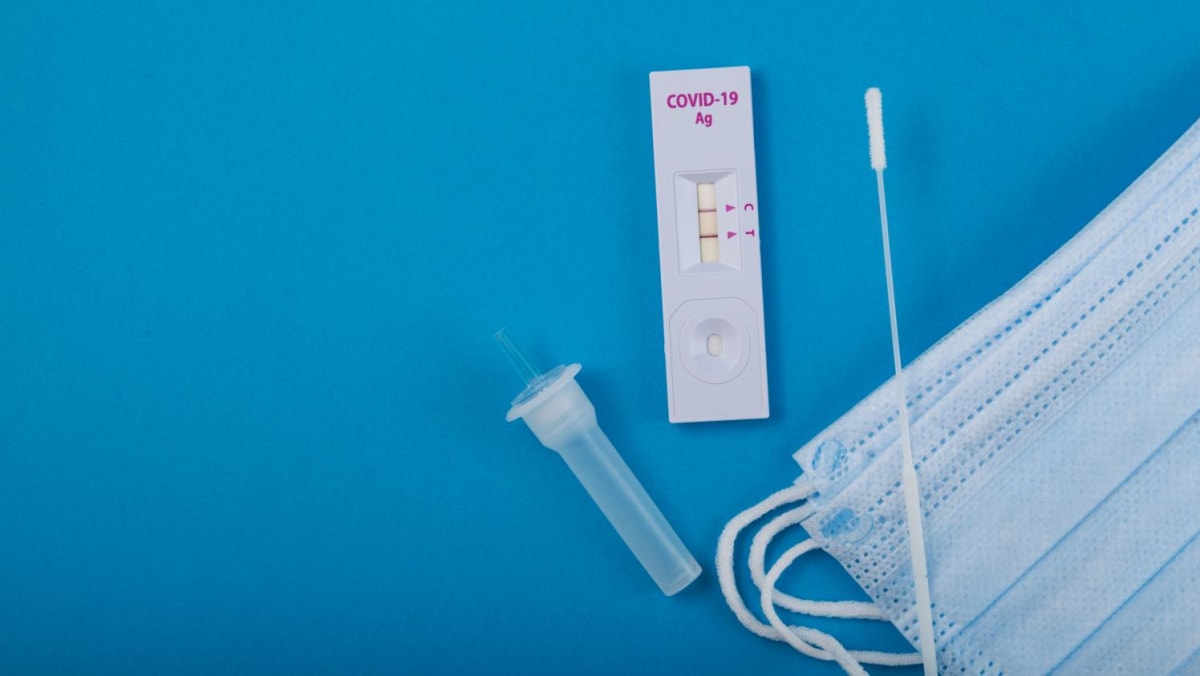
SINGAPORE: From Monday (Jul 17), each household in Singapore will receive six antigen rapid test (ART) kits, said the Ministry of Health (MOH) on Sunday.
The distribution will last until Sep 30 and the kits will be drawn from the national stockpile which was built to mitigate supply chain disruptions and sudden surges in usage, MOH added in a press release.
The current batch of ART kits have a remaining shelf life of about six months, as the stockpile needs to be refreshed to maintain resiliency.
“The distributed ART kits are expected to expire in the first quarter of 2024,” said MOH.
The ministry added that the usable period of the ART kits can still “cover the year-end”, coinciding with the Northern Hemisphere winter season, during which respiratory viruses including influenza and COVID-19 may spread more easily globally.
“Many also take overseas vacations during this period and the kits will help families to take additional precautions where needed.”
With the shift towards COVID-19 endemicity, MOH advised Singaporeans to take measures to protect themselves and their families, especially seniors and medically vulnerable people.
It added that people who test positive with an ART test “should regard themselves as being infected with COVID-19”.
They should avoid close contact with others while still symptomatic and return to normal activities when their symptoms resolve.
Car rally demands anti-Pita senators quit

About 700 people using 500 cars and motorcycles joined a rally in central Bangkok on Sunday afternoon to demand the resignation of the senators who did not vote for prime ministerial candidate Pita Limjaroenrat of the election-winning Move Forward Party on Thursday last week.
The demonstrators first gathered at Democracy Monument and then moved to the headquarters of the navy, the army and the police.
The chiefs of the armed forces and the police as well as the chief of the defence forces and the permanent secretary for defence, all senators, were absent from the joint sitting of the House and the Senate last Thursday when parliamentarians held their vote on Mr Pita, the then sole prime ministerial candidate and leader of the Move Forward Party.
Leading the demonstration, activist Arnon Nampa said that if those senators resigned, the threshold majority vote from the House and Senate would be sufficient for Mr Pita to become prime minister.
“It (the resignation) would reduce the votes of senators and the number of (majority) votes needed to elect the pro-democracy parties to be lower than 376,” Mr Arnon said.
The military-drafted constitution allows 250 unelected senators to join the vote on prime minister together with 500 elected House representatives.
Mr Arnon called on senators to vote for Mr Pita in the next round of the prime ministerial vote. He said Mr Pita was the prime ministerial candidate of the eight political allies which had a majority in the House, 312 out of 500 votes.
“We ask the senators who will join the next vote to respect the people’s choice by voting in favour of the eight coalition parties,” he said.
On Thursday last week just 13 of 249 senators voted in favour of Mr Pita.
Mr Arnon said that demonstrators gave their moral support to the 312 House representatives and the 13 senators who voted for Mr Pita last week.
Regarding the car rally on Sunday, the activist said he hoped the activity would encourage people nationwide to come out and show their support in accordance with their choice in the May 14 general election.
“I would like people to get up and fight for a national administration by a pro-democracy government,” Mr Arnon said.
“The most politically legitimate person (as the new prime minister) is Mr Pita Limjaroenrat, leader of the Move Forward Party which won the election,” he said.
He urged the eight coalition parties to remain united. If the Move Forward Party or the Pheu Thai Party joins forces with any political party from the caretaker government, people will curse them, Mr Arnon said.
MFP and Pheu Thai are the two main parties in the eight coalition alliance.
After visiting the headquarters of the army, the navy and the police, the car rally was set to reach its destination at the front of the Bangkok Art and Culture Centre in Pathumwan area.
Average compensation of S$3,000 for Anchorvale Village flat buyers due to completion delay

SINGAPORE: Nearly 200 flat buyers of Anchorvale Village will be eligible for compensation of between S$1,100 (US$830) and S$4,500 for the completion delay brought about by the COVID-19 pandemic.
This comes as the Housing and Development Board (HDB) on Sunday (Jul 16) announced the completion of 12,000 flats across 16 projects in the first half of 2023 – both the highest figures compared with the same period since 2018.
Among the completed projects is Anchorvale Village in Sengkang where the residential blocks were delayed beyond their delivery possession date, which refers to the legal contractual date by which HDB is required to deliver possession of the flat.
Under the COVID-19 (Temporary Measures) Act, flat buyers whose flats are delayed beyond the delivery possession date will be able to seek reimbursement for qualifying costs.
The residential blocks were completed in June, five months after the project’s original delivery possession date of January 2023.
A total of 197 households of Anchorville Village who booked their flats by May 4, 2022 are eligible for the reimbursement, said HDB in a news release.
“To minimise inconvenience to flat buyers, HDB will be offering to pay flat buyers of Anchorvale Village the maximum reimbursement sum that they would be eligible for, without them having to submit any claims/proof of the expenses,” said the Housing Board.
The buyers will receive the reimbursement within two months after completing the flat purchase and accepting the settlement agreement.
The estimated amount for the affected flat buyers ranges from S$1,100 to S$4,500, with the average reimbursement sum being about S$3,000.
The total reimbursement amount for all 197 households is estimated to be about S$600,000, said HDB.
Flat buyers were invited to collect their keys on Jul 10, said HDB, with 115 households having done so to date.
Anchorvale Village is one of the two BTO projects delivered past its delivery possession date, the other being Waterway Sunrise II.
“With the successful completion of Anchorvale Village, HDB has handed over both delayed projects, despite the challenges posed by COVID-19,” said HDB.

